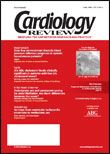Publication
Article
Cardiology Review® Online
Continuing Medical Education Exam
Target: Diabetes
From "
"
A systematic review of metformin treatment in persons at risk for diabetes mellitus
Learning objectives
Describe the effect of metformin treatment on weight, lipid levels, fasting blood glucose levels, and insulin resistance in patients at high risk of developing diabetes.
Questions
- When all trials included in this meta-analysis (with and without new cases of diabetes) were pooled together, metformin reduced the absolute risk of diabetes by: 4.5% 5% 5.6% 6%
- Statistically significant reductions in body mass index (BMI) were seen in which study subjects using a daily dose of metformin higher or lower than average? With polycystic ovary syndrome Without polycystic ovary syndrome With obesity All of the above
- The included trials also evaluated other beneficial effects of metformin treatment that could reduce cardiovascular risk. In addition to the metabolic parameters studied here, metformin treatment significantly reduced all of the following, EXCEPT: Visceral fat mass Tobacco use Systolic and diastolic blood pressure Waist circumference
- One trial in this study found that _________ produced the most significant reductions in weight. metformin monotherapy intensive lifestyle modifications metformin combined with intensive lifestyle modifications rosiglitazone monotherapy
- In comparing thiazolidinediones (rosiglitazone and pioglitazone) with metformin in the treatment of diabetes, the authors found 1 randomized trial of rosiglitazone in persons at risk for diabetes that noted a 60% reduction in progression to diabetes over 3 years; however, treatment was associated with a 3% increase in _________ compared with placebo. weight low-density lipoprotein cholesterol myocardial infarction hypertension
To take this exam, you can
. Cardiology Review materials are posted to that site on a continuous basis (registration required).
download the CME answer form (PDF) and mail, fax, or email it to address given; or go to the University of Cincinnati's Center for Continuous Professional Development
Target: Diabetes/Women’s Health
From "
"
Diabetes-related poor outcomes and complex interactions with sex and age in chronic heart failure
Learning objectives
Gain a better understanding of the effect of diabetes on patients with heart failure, especially the extent to which the shared risk factors of these conditions affect patient prognosis.
Questions
- Findings from this propensity-matched study, in which patients with or without diabetes were well balanced in all measured baseline characteristics, suggest that the presence of diabetes was associated with increased mortality and hospitalization in ambulatory patients with chronic mild-to-moderate heart failure receiving: beta blockers angiotensin II receptor blockers angiotensin-converting enzyme inhibitors statins
- Overall, 36% of patients in this study died from all causes and 69% were hospitalized for any cause during a median follow-up of 38 months. Compared with a 40% rate of all-cause mortality in patients with diabetes, only _________ of those without diabetes died. 33% 27% 17% 8%
- Diabetes-related death in this study was _________. similar in younger and elderly women similar in younger women and elderly men higher in elderly men higher in elderly women
- The deleterious effects of diabetes in heart failure patients may well be attributed to direct metabolic effects. Changes at the myocardial level caused by these effects result in more severe left ventricular remodeling and: Diastolic dysfunction Lethal arrhythmias Acute ischemia Pulmonary edema
- Key limitations of the study include bias due to unmeasured covariates, lack of a central adjudication of the diagnosis of diabetes, and lack of data on the duration and control of diabetes. Lack of routine use of __________ may limit generalizability to current practice somewhat. angiotensin-converting enzyme inhibitors angiotensin II receptor blockers beta blockers calcium channel blockers
To take this exam, you can
. Cardiology Review materials are posted to that site on a continuous basis (registration required).
download the CME answer form (PDF) and mail, fax, or email it to address given; or go to the University of Cincinnati's Center for Continuous Professional Development






